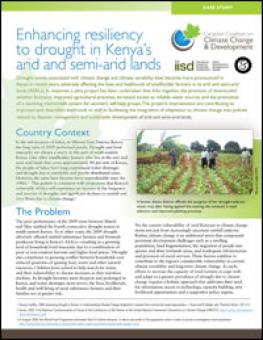
Enhancing resiliency to drought in Kenya's arid and semi-arid lands
The case study Enhancing resiliency to drought in Kenya's arid and semi-arid lands provides an overview of a pilot project undertaken in Kenya between 2005 and 2010 that linked together the provision of downscaled weather forecasts, improved agricultural practices, increased access to reliable water sources and the promotion of a revolving microcredit system for women's self-help groups.
Implemented by the Nairobi-based Centre for Science and Technology Innovations in collaboration with the Arid Lands Resource Management Project, the pilot project responded to the fact that drought associated with climate change and climate variability have become more pronounced in Kenya in recent years, adversely affecting the lives and livelihoods of smallholder farmers in its arid and semi-arid lands.
The case study is one of six produced by the Canadian Coalition on Climate Change and Development (C4D) in 2010, along with an accompanying synopsis of lessons learned, as part of its Climate Change Adaptation: Lessons from Canadian NGOs initiative. Drawing directly from the experience of Canadian NGOs and their partners in the global South, the case studies highlight climate change impacts and how local communities are reducing their vulnerability to changing conditions. Financial support for this initiative was provided by the International Development Research Centre.
In 2013 an epilogue to this case study was prepared by Cynthia Awuor. The epilogue highlights how activities that build resilience to climate change at the field level continued after the ACCESA pilot project ended in 2010. It was one of 10 new and updated case studies prepared by C4D in partnership with Canadian NGOs.
The Kenya case study profiles one of three pilot projects being implemented as part of the regional project, Integrating Vulnerability and Adaptation to Climate Change into Sustainable Development Policy Planning and Implementation in Eastern and Southern Africa (ACCESA). This project was implemented by the International Institute for Sustainable Development on behalf of the United Nations Environment Programme. Funding for this project was provided by the Global Environment Facility and the governments of the Netherlands and Norway, and supported by in-kind contributions from the governments of Germany and Kenya. Further information is available here.
Participating experts
You might also be interested in
Women Turning the Table on Food Loss and Waste in Kenya
A group of changemakers led a movement to tackle food loss and waste in Kenya. IISD experts have been working closely with local women leaders to make change happen.
Envisioning Resilience: Women's Voices on Climate Change in Ghana and Kenya
As countries advance their National Adaptation Plan (NAP) processes, the need for meaningful participation by people on the frontlines of climate change becomes increasingly clear.
Multilateral Development Bank Efforts to Mainstream Climate Adaptation
The paper explores the progress of four MDBs in mainstreaming climate adaptation in their developing country portfolios, specifically looking at experiences in Kenya, Nepal, and Peru.
Growing Tea Sustainably: Examples from Kenya, India, and Sri Lanka
From climate change impacts to price fluctuations, producing tea can be a volatile business. Here's how some of the world’s major tea-producing countries are making the industry more stable—and sustainable.